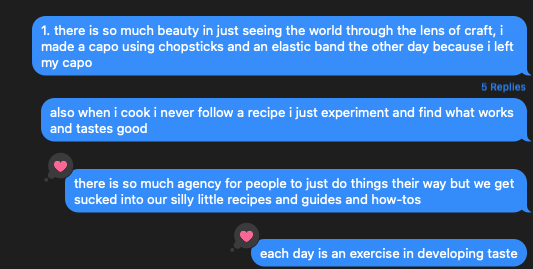That’s all life is really—a giant sequence of decisions. Life is the expression of taste

Taste is built over time through repeated applications. It requires intention, focus, and care. Taste is a commitment to a state of attention. It’s a process of peeling back layer after layer, turning over rock after rock. It is the manifestation of self-confidence in what we find beautiful.
Curiosity and an inherent observatory nature toward the world serve as constant opportunities to test your taste. The process of cultivating taste is a lot like the writing and editing process. George Saunders on the revision process:
“The way I revise is: I read my own text and imagine a little meter in my head, with “P” on one side (“Positive”) and “N” on the other (“Negative”)… This involves making thousands of what I’ve come to think of as “micro-decisions.” These are instantaneous, intuitive – I just prefer this to that… I just have a feeling and react to that feeling, in the form of a cut phrase, or an added word, or an urge to move this whole section, and so on. And then I do that over and over, for months, sometimes years, until that needle stays up in the “P” zone for the whole length of the text…With each choice, even the smallest ones, the story becomes more and more…well, it becomes more her, you could say. There’s more of her essential nature in it, more of what will distinguish her from all of those other writers out there. And gradually, the story starts to become something she couldn’t have foreseen when she started out – bigger, more complex, smarter, funnier, whatever.”
Creation and Research
It is this taste that is so important in independent research. Without taste, one cannot carve out their own iconic space.
Creation is the act of bringing something nonexistent into reality. You have to have strong opinions about how the world should work. You have to think that things should be a certain way, that you prefer this color over that, this form of walking over another, this sense of beauty over theirs, this way of approaching the world over some other. Taste gives you the capability and the urgency to imagine.
(Spencer, creative seeing)
Taste is the ability to know what the good questions to ask are.
When [Grothendieck] writes that his peers were more brilliant than him, he is referring to their ability to answer questions. It was just that their questions were unoriginal. (Henrik Karlsson, Good Ideas)
Failure
As keen as some of us are to do life “right”, sometimes the only way to do it right is to make your own decisions. Try. Fail.
There’s only one person who bears the responsibility of your life and it’s the same person who shrugs that responsibility off when it feels too heavy
See: the-fools-who-dream